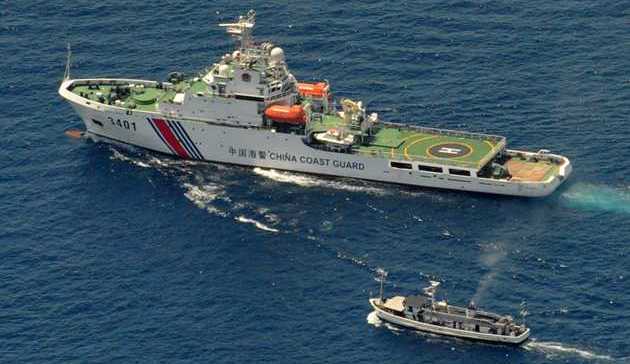|
Vigilant over China's new plots in the
East Sea
China
understands that the United States, Japan and other major powers know about
its plots in the East Sea, internationally known as the South China Sea.

The term “sovereignty” could be
understood in two main ways [1]: (1) being recognized by the international
community and in conformity with international conventions on sovereignty and
(2) based on the state's ability to protect national sovereignty,
particularly ensuring defense and security; protection of people's rights to
exploit natural resources and live on the place where their ancestors lived,
whether it is land, sea or islands.
When the two demands are
incompatible, ie the ability to ensure national security disproportionate to
the rights recognized by international conventions, then sovereignty disputes
can break out.
Thus, national sovereignty is not an
absolute, eternal concept. With the inherent imbalance of economic and
military power among countries, the economic, political and military
relations between different countries that share the same strategic
interests, which are consistent with international conventions and law, would
create formal or informal alliances. For instance, the United States promoted
the formation of the ASEAN bloc during the Cold War.
The strength of a bloc or alliance
can create a powerful deterrence to the compression or invasion of any
powerful nation against a small country, which belongs to an alliance. Once
the alliance weakens, the balance of the international and regional order is
changed, due to the appearance of the empty space of power. However, whether
the change in the regional order will become a trend or not, is largely
depends on the justice of such processes, or whether it is suitable with
standards of international order and recognized by most countries around the
world.
The years 2008 - 2010 witnessed a
global crisis, starting from the United States and then spreading to
countries in Western Europe. That leads to two consequences:
Firstly, the United States, due to
mounting debt pressure after the two wars in Iraq and Afghanistan and the
economic crisis, has weakened a lot about the possibility of deploying hard
power to maintain international order in the strategic waters.
Secondly, the weakening of the US
economy after the crisis and the rise of China have changed the flow of
trade, international capital in the way of increasing the dependence of the
periphery countries on economic power and soft power of China.
China’s economic and trade expansion
in several countries in Southeast Asia, Africa, and Latin America reflects
this trend. In other words, the existing order has weakened, along with it
the ability to protect the sovereignty of the member states of alliances,
such as Japan - the US or cooperation blocs, such as ASEAN, is challenged.
In this context, China faces two
choices: the first is in collaboration with the world powers, led by the US,
to maintain regional order; consolidate stability and prosperous development
based on collaboration and global trade. The second is to replace the US,
forming a new world order and establishing a new military coalition headed by
China, aimed at forcing the conformation of the new order [2].
In fact, the Chinese have chosen the
second path as its long-term goal. This process begins with the violation of
the United Nations Conventions on the Law of the Sea 1982 (UNCLOS) in the
East Sea, to gradually transform it into its own waters.
The key point here is there are very
clear differences between the international maritime route and the maritime
route in the territory of China. When political or interest conflicts arise,
China can use the control right to ban relevant nations from free navigation
in the East Sea, although in principle China commits to maintaining freedom
of navigation.
This cannot happen if China is unable
to hold de facto control rights in the waters. Therefore, the sovereign
conflict in the East Sea is not just a bilateral issue, but a matter of
regional security and global trade.
China understands this well and also
understands that the US, Japan and other major powers know clearly about its
plots in the East Sea. The holdup problem on the international level
demonstrates the long-run ambition of China.
Careful analysis of this plot will
create an international consensus to resolve the current conflict, which
China is trying to turn into bilateral disputes with its neighbors over
"undisputed" sovereignty in which China is the abused side.
Le Hong Nhat, VNN
About the author: Nhat has a Ph.D.
diploma of economics at the Stanford University (USA). He is now a lecturer
at the University of Economics - Law, National University of HCM City and a
non-resident senior fellow at the Saigon Center for International Studies
(SCIS), HCM City University of Social Sciences and Humanities.
This article was first published at
the SCIC and published on VietNamNet under the cooperation program with
Nghiencuuquocte.org.
-------
[1] According to
Stephen D. Krasner (1999), the term “sovereignty” could be understood in two
main ways: (1) domestic sovereignty – actual control over a state exercised
by an authority organized within this state. (2) international legal
sovereignty – formal recognition by other sovereign states.
[2] According to
the research institute of China, Unirule (2011)
|
Thứ Hai, 14 tháng 3, 2016
Đăng ký:
Đăng Nhận xét (Atom)
Không có nhận xét nào:
Đăng nhận xét